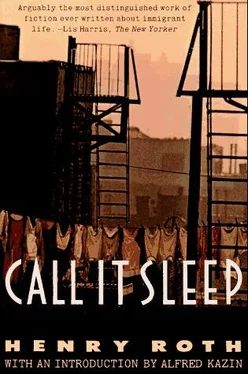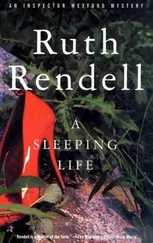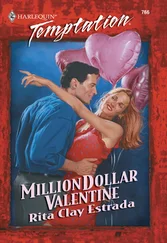“Didja ask yuh modder fuh a nickel fuh de Xmas poddy in school?”
“No. I fuhgod.”
“My ticher calls id Xmas, bod de kids call id Chrizmas. I’ds a goyish holiday anyways. Wunst I hanged up a stockin’ in Brooklyn. Bod mine fodder pud in a eggshells wid terlit paper an’ a piece f’om an ol’ kendle. So he leffed w’en he seen me. Id ain’ no Sendy Klaws, didja know?”
“Yeh.”
“How does a prindin’ press look wot hoitshuh fodder?”
“Id’s like a big mechine.”
“Id don’ go boof?”
“No. Id makes like dat calenduh I woz saving.”
“Oh…”
They neared the group. Annie was still among them. David no longer cared.
“Hey!” Yussie seized his arm eagerly. “Dey’s Jujjy de one wod fell w’en yuh pushed him. Yuh wan’ me t’ make yuh glad on him?”
“Yeh.”
“So tell him f’om de p’lice station. He’ll be glad! Tell me too! So yeh?”
“Yeh.”
“Hey Jujjy!” Yussie hailed them. “Hea’s Davy! He wandsuh be glad on yuh. He’s gonna tell yuh aboud de p’lice station! Aintcha, Davy?”
“Yeh.”
I
IN FEBRUARY David’s father found the job he wanted — he was to be a milkman. And in order that he might be nearer the stables, they moved a few days later to 9th Street and Avenue D on the lower East Side. For David it was a new and violent world, as different from Brownsville as turmoil from quiet. Here in 9th Street it wasn’t the sun that swamped one as one left the doorway, it was sound — an avalanche of sound. There were countless children, there were countless baby carriages, there were countless mothers. And to the screams, rebukes and bickerings of these, a seemingly endless file of hucksters joined their bawling cries. On Avenue D horse-cars clattered and banged. Avenue D was thronged with beer wagons, garbage carts and coal trucks. There were many automobiles, some blunt and rangy, some with high straw poops, honking. Beyond Avenue D, at the end of a stunted, ruined block that began with shacks and smithies and seltzer bottling works and ended in a junk heap, was the East River on which many boat horns sounded. On 10th Street, the 8th Street Crosstown car ground its way toward the switch.
His own home was different too. They lived on the fourth floor now, the top floor of the house. There was no cellar door, though a door did lead to the yard. The stairs were of stone and one could hear himself climb. The toilets were in the hall. Sometimes the people in them rattled newspapers, sometimes they hummed, sometimes they groaned. That was cheering.
He became very fond of his own floor. There was a frosted skylight over the roofstair housing that diffused a cloudy yellow glow at morning and a soft grey haze at afternoon. After one climbed from the tumult of the street, climbed the lower, shadowier stairs, a little tense, listening to toilets, entering this light was like reaching a haven. There was a mild, relaxing hush about it, a luminous silence, static and embalmed. He would have liked to explore it, or at least to see whether the roof door was locked, but the thought of that height, that mysterious vacancy and isolation dissuaded him. There was something else besides. The stairs that led up were not like the stairs that led down, although both were of stone. Common stairs were beveled to an edge, hollowed to an aching trough by the tread of many feet, blackened beyond washing by the ground-in dirt of streets. But these that led up to the roof still had a pearliness mingled with their grey. Each slab was still square and clean. No palms of sliding hands had buffed the wrinkled paint from off their bannisters. No palms had oiled them tusk-smooth and green as an ax-helve. They were inviolable those stairs, guarding the light and the silence.
There were four rooms in the flat they lived in. There were eight windows. Some faced 9th Street, some faced Avenue D, and one looked out upon the dizzying pit of an airshaft. There was no bathtub. The partition separating the two adjacent washtubs had been knocked down, and they bathed in that. The bottom felt like sandpaper. One had to be careful not to draw too much water or one might float.
At home the routine of life had changed. His father no longer left for work early in the morning to return at night. Instead he left at night, in the incredible depths of night, and returned early in the morning. During the first few nights, his father’s arising from bed had wakened him also, and he had lain perfectly quiet, listening to the slow heavy tread in the kitchen that was followed soon by the alternate sounds of a bare foot and a shod foot, and then the running water and the scuffing chairs; had lain there listening till his father had left, and then in drowsy thought had followed him down the stone stairs, had imagined in snugness the graduate cold, the night wind on the stoop, the silence, and sunk again through cloudy desolation into sleep.
Brownsville was fading from his mind, becoming soon a troubled nebulous land, alien and diverging. He was glad they had moved away …
II
AT THE beginning of April, David began hearing rumors of an aunt, Bertha, a younger sister of his mother, who was coming to this country. When at first, his mother had suggested that Bertha be permitted to live with them awhile, his father refused to hear of it. Had he not thrown himself at his wife’s feet and begged her to permit Luter to live with them? May fire consume Luter now, but hadn’t he? She had refused then; well he would repay her now. Bertha wouldn’t be allowed in the house.
But David’s mother persisted. “Where could the poor creature go alone in a strange land?”
“Poor creature!” His father had scoffed. As far as he was concerned, let her find a home under earth. He would have nothing to do with her. Did she think he had forgotten her, that gross, ill-favored wench with her red hair and green teeth. And heaven preserve him — her mouth!
But she was only a girl then, forward and flighty. She would have changed by now.
“For the worse!” he had answered. “But I know what you want her here for. You want her here so you can spend the entire day clacking your tongue with an endless he-said-and-I-said.”
No, there would be very little of that. Bertha was handy with the needle. She would soon be working and not at home at all. And hadn’t he himself come to this land alone and a stranger? Had he no pity on another in the same plight? And a woman at that! Could he be so inhuman as to expect her to turn away someone of her own blood in this wilderness?
At last, he had been won over and finally growled his consent. “Talking won’t help me,” he said bitterly, “But don’t blame me if anything goes wrong. Remember!”
It was some time in May that Aunt Bertha arrived, and the first thing that David thought when he saw her was that his father’s sarcastic description had not been exaggerated. Aunt Bertha was distressingly homely. She had a mass of rebellious, coarse red hair, that was darker than a carrot and lighter than a violin. And the color of her teeth, if one had to decide upon it, was green. She used salt, she said — when she remembered. The first thing David’s mother did was to buy her a tooth brush.
She had no figure and no vanity about her appearance. “Alas!” she said. “I look like one butter firkin on another.”
A single crease divided fat fore-arm from pudgy hand. Her legs landed into her shoes without benefit of ankles. No matter what she wore, no matter how new or clean, she always managed to look untidy. “Pearl and cloth of gold would stink on me,” she confessed.
Her ruddy skin always looked as if it were about to flake with sunburn. She perspired more than any woman David had ever seen. Compared to his mother, whose pale skin always had a glossy look that no heat seemed able to flush, his aunt’s red face was like a steaming cauldron. As the weather grew warmer, she began using the largest men’s handkerchiefs, and at home she always tied a napkin around her short throat. “The sweat tickles me at the bend,” she explained.
Читать дальше












